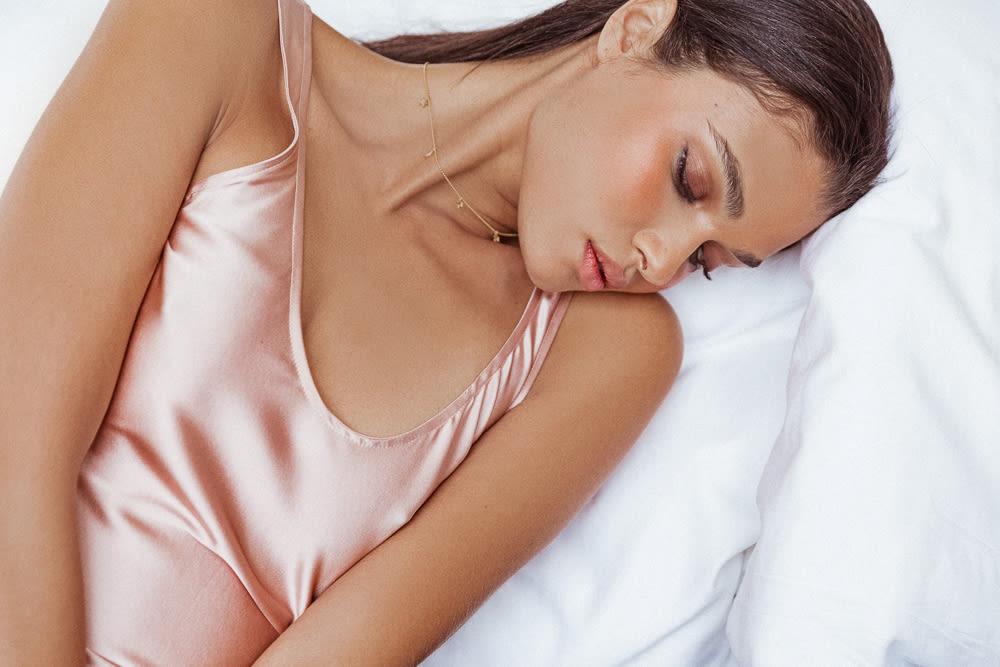At a certain point, the pinnacle of beauty became looking like you just had sex—once I started noticing it, I couldn’t un-see it. Nars sells one Orgasm blush every minute. (They’ve also got another blush called Deep Throat, and a mascara called Climax.) Eye makeup wasn’t really smudgy, like you might have rolled around and sweat in it, until makeup artist Linda Cantello created the sexy, smoky eye for a Tom Ford-helmed Gucci. And aren’t messy, textured beach waves just a stylized version of sex hair? Here’s an article from Elle Magazine with 10 products to make you look like you just had sex, and one from Women’s Health that says the same thing with a slightly cruder headline. ITG even covered the topic both seven and four years ago. Whew! It’s been long enough that maybe this isn’t a trend.
Why is beauty so obsessed with the “post-O glow”?
Or, at least, a stylized version of it—because I certainly don’t think I look like a runway model after even a quickie with the air conditioning on.
I decided to investigate.
The most obvious reason a person might want to look like they just had sex is that it appeals to our monkey brains. In its most crude, evolutionary simplification, we're attracted to each other so that we make babies and propogate the species. That’s why Charles Darwin, famous for his work on evolution, spent considerable time and energy thinking about… blush. In his book The Expression of the Emotions in Man and Animals, Darwin called blushing “the most peculiar and the most human of all expressions,” mostly because humans are the only animals actually capable of doing it. And blushing is an integral part of the female arousal response: heart rate quickens, breathing speeds, blood rushes to your nether regions and, thanks to a flood of adrenaline, the blood vessels in our faces dilate. Those with female anatomy experience “sex flush” more often than those with male anatomy (about 50 to 75-percent, versus only about 25-percent). And a blushing effect, albeit much more subtle, also occurs when women are their most fertile: in one study, a redder face was noticed during ovulation.
On the flip side, several studies have observed that the color red increases male interest and arousal. As researchers in this University of Rochester study note, “Men seem unaware of this red effect, and red does not influence women's perceptions of the attractiveness of other women.” The “red effect” is observed in primates as well as humans, and for the best example, look to baboons. (When a female baboon is ready to mate, her butt turns bright red.) Using that logic, in humans, a red flush might work like some secret, sexy code for “come hither.” And it’s been used that way throughout history: in Ancient Greece, red lipstick was used to differentiate sex workers from their more virginal peers. In the 1700s, laws to control the use of red lipstick were passed in both England and the United States, citing fear of its seductive irresistibility. And much more recently, Benefit launched a pink-red nipple tint that consumers figured out worked just as well on their lips and cheeks.
However, that’s just one theory.
The thing is, blush is a key aspect of the just-had-sex makeup look, but not the only one. Those with darker skin tones might not notice a sex flush, and a Darwinian approach doesn’t really explain our attraction to non-physiological markers of sex, like smudgy eyes and tousled hair.
So let’s back up. Remember our old pal Darwin? The other thing that baffled him about blushing is that it's “not only involuntary; but the wish to restrain it...actually increases the tendency.” In other words, you blush when you’re embarrassed, and then get even more embarrassed when other people can visibly see you’re embarrassed, which makes your blushing worse. It's uncontrollable. Maybe the reason a flushed face became so intertwined with sex appeal is that, back then, it was the only sign of sexuality women couldn't primp and polish to conceal. Tousled hair, sweaty skin, smudgy eyes... you would never see a woman looking like that without actually being intimate with her.
Is it possible that, by imitating the visual cues of an afternoon romp, women figured out how to toy with the illusion of intimacy too? Interestingly, just observing someone else revealing something intimate can cause you to let your guard down. In their 2017 cover story on intimacy, Psychology Today cites a study done through the University of Kansas demonstrating that when shown an erotic photo, even subliminally, participants were more willing to “disclose personal information, make sacrifices to benefit their current romantic partner, and work out conflicts effectively.” In the case of sex-imitating makeup, the woman may be taking the risk, but the men take the bait.
As sex therapist Dr. Marianne Brandon notes, “In general, the more sexually directive you become, the more likely your partner is to follow you. The more vulnerable you become, the more your partner will take the lead.” In this way, intimacy (or the illusion of it) is a power move. Maybe making yourself look like you just had sex conveys enough vulnerability to inspire that guy across the bar to come over and ask for your number. Of course, attitudes have shifted and we’re no longer so ashamed about having a sex life that we feel the need to hide every marker of it. But the intimacy of seeing someone the morning after, hair disheveled, makeup smudged, face flushed, hasn’t really gone away. It’s still a version of you not usually shown to the public.
That’s my working theory, as of right now.
Of course, maybe I’m reading too far into this. It’s also entirely possible that sex just sells. Or that, in today’s day and age, we just want everyone to think we’re getting laid. Maybe the only thing being signaled is that we’re desirable and desired, and too busy to go through the pains of hiding it. Whatever the reason, dewy skin, a warm flush, tousled hair, and smudgy eye makeup doesn’t seem to be going anywhere any time soon. Let’s continue this conversation in the comments.
—Ali Oshinsky
Photo via ITG

